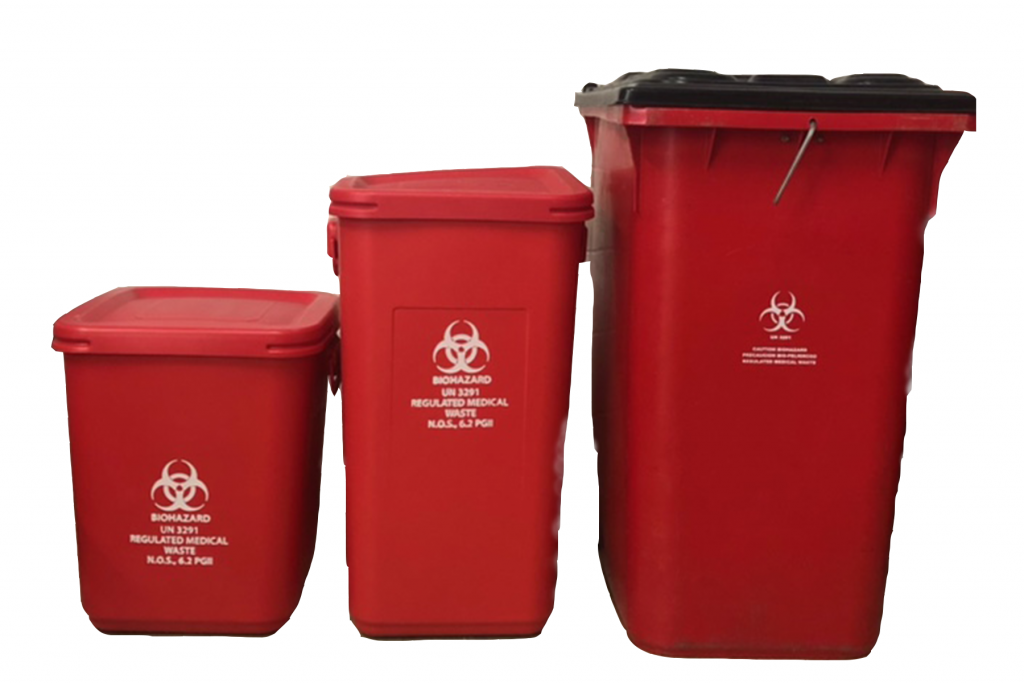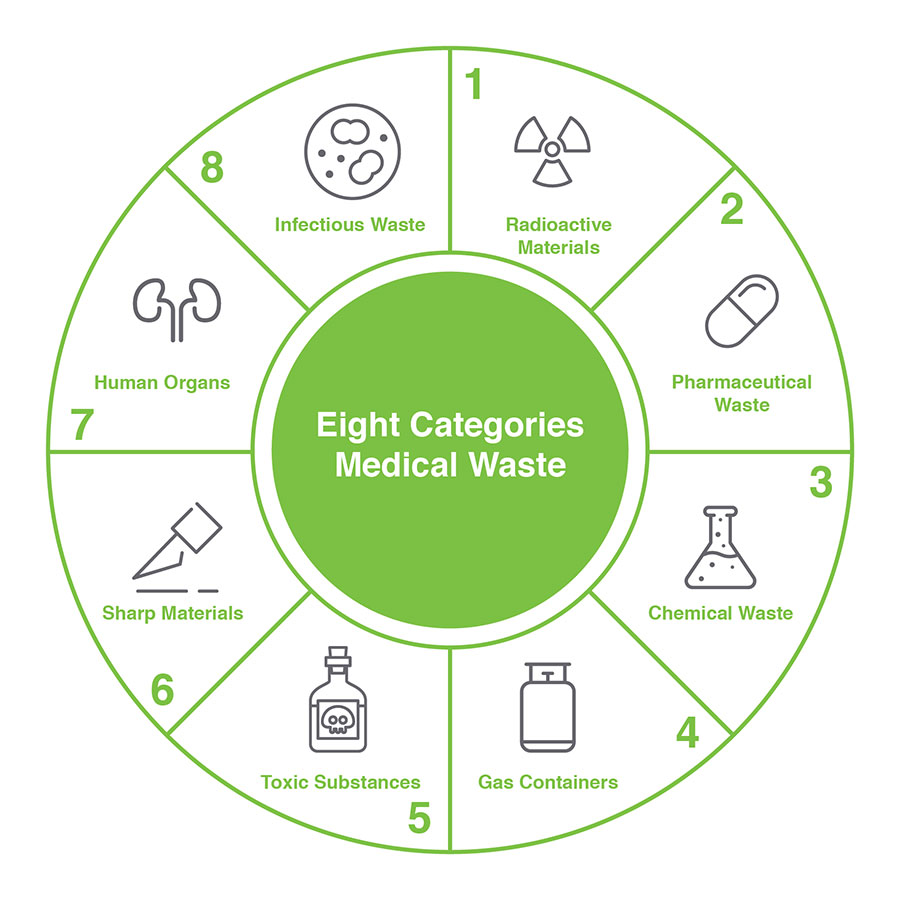Medical Waste Removal Quality: Elevating Security Specifications in Your Center
Medical Waste Removal Quality: Elevating Security Specifications in Your Center
Blog Article
Stay Ahead of Laws: Specialist Advice on Medical Waste Disposal
In a globe where the healthcare industry is continuously progressing, it is vital for medical centers to remain in advance of laws when it comes to the proper disposal of medical waste. With rigid standards and constant governing modifications, it can be testing to browse the complexities of this process. With experienced advice, centers can make certain conformity and alleviate dangers connected with incorrect waste disposal. From understanding the various groups of clinical waste to implementing the right collection and partition approaches, this conversation will offer actionable tips and valuable understandings to assist centers remain ahead of regulations in the ever-changing landscape of clinical garbage disposal.
Understanding Clinical Waste Categories
Understanding clinical waste classifications is crucial for proper disposal and monitoring in healthcare centers. Clinical waste refers to any waste generated by medical care tasks that may posture a risk to public wellness or the environment. It is vital to classify medical waste precisely to guarantee its safe handling, therapy, disposal, and transport.
There are a number of groups of clinical waste that healthcare centers require to be acquainted with. The most typical classifications consist of transmittable waste, pathological waste, sharps waste, pharmaceutical waste, and chemical waste. Each category has particular standards and laws for its proper monitoring and disposal.
Infectious waste includes materials polluted with blood or other physical fluids, such as gloves, gowns, and lab societies. Pathological waste describes human cells, organs, or body components that need unique handling and disposal. Sharps waste consists of made use of needles, syringes, and various other sharp items that can create injury and transmit infections. Pharmaceutical waste makes up ended, extra, or contaminated medications that need cautious handling and disposal. Chemical waste includes solvents, disinfectants, and other chemical substances used in healthcare facilities.
Staying Up-To-Date With Regulatory Changes
Remaining existing with regulative modifications is critical for health care centers to make sure compliance and proper management of clinical garbage disposal. medical waste removal. With regulations frequently advancing, it is necessary for health care centers to remain updated to avoid fines, penalties, and potential harm to the environment and public wellness
To stay in advance of regulative changes, health care facilities need to establish a system for surveillance and monitoring updates. This can be done by signing up for regulative e-newsletters, participating in meetings and workshops, and proactively getting involved in market organizations. In addition, facilities need to mark a team member or group accountable for remaining educated and sharing info to pertinent stakeholders.
Routine interaction with regulatory firms is additionally crucial. Healthcare centers ought to develop connections with neighborhood, state, and federal companies to guarantee they recognize any type of changes in guidelines that might impact their waste administration techniques. This can be done through regular meetings, involvement in public remark periods, and positive interaction with regulatory agencies.
Furthermore, medical care facilities should think about partnering with waste management companies that specialize in medical waste disposal (medical waste disposal services with WasteX). These firms are often skilled in the current regulations and can offer support and assistance to make certain compliance
Executing Proper Collection and Segregation Techniques
To successfully take care of clinical garbage disposal, health care centers have to develop correct collection and partition approaches in conformity with regulative guidelines. Carrying out these techniques ensures the risk-free handling and disposal of potentially dangerous materials, protects the environment, and minimizes the threat of injuries and infections to medical care employees and the public.
Appropriate collection and segregation methods involve the use of designated containers and labeling systems. Medical care centers ought to offer clearly identified containers for various kinds of clinical waste, such as sharps, infectious waste, pharmaceutical waste, and non-hazardous waste. a fantastic read These containers should be color-coded and clearly significant to stay clear of confusion and promote easy recognition.
In addition, health care centers ought to train their team on the right procedures for accumulating and segregating medical waste. This consists of informing them on the different sorts of waste, the proper containers to make use of, and the relevance of complying with guidelines and laws. Normal training sessions and refresher course training courses ought to be performed to make sure that personnel continue to be current on ideal practices.
Furthermore, health care centers must establish a system for routine collection and disposal of medical waste. This may entail partnering with certified waste monitoring companies that concentrate on medical garbage disposal. These firms will certainly make certain that the collected waste is medical waste disposal services with WasteX moved and taken care of in conformity with regulatory requirements.
Selecting the Right Disposal Techniques

Incineration is just one of one of the most effective and common methods for taking care of specific sorts of medical waste, such as pathological waste and sharps. It involves the regulated combustion of waste at high temperature levels, minimizing it to ash. However, incineration can launch dangerous toxins right into the air and add to air contamination.
Various other disposal approaches include chemical treatment, microwave treatment, and landfilling. Chemical therapy includes the use of chemicals to sanitize and neutralize the waste. Microwave treatment uses microwave energy to heat and sanitize the waste. Landfilling involves burying the waste in a marked garbage dump area (medical waste disposal services with WasteX). Nevertheless, landfilling must be the last hope as a result of the potential threat of contamination to soil and groundwater.
Guaranteeing Compliance With Paperwork and Training
After very carefully taking into consideration the appropriate disposal techniques for clinical waste, medical care centers need to make certain conformity with regulations and minimize environmental impact by executing efficient documentation and training procedures. This action is critical in keeping a sustainable and safe environment for both healthcare workers and the public.

Training is similarly crucial in ensuring compliance with guidelines. Medical care workers who manage medical waste needs to receive suitable training on waste partition, handling, and disposal procedures. This training ought to cover topics such as the correct use personal safety equipment, identification of various sorts of waste, and the proper disposal methods for every waste classification. By giving comprehensive training, healthcare facilities can empower their personnel to make enlightened choices and lessen the threat of inappropriate garbage disposal.
Conclusion
Finally, staying in advance of laws in clinical garbage disposal is crucial for healthcare centers. medical waste removal. Recognizing the various classifications of medical waste, remaining upgraded with regulative modifications, executing proper collection and partition approaches, selecting the suitable disposal methods, and guaranteeing compliance via paperwork and training are all vital steps. By following these standards, medical care organizations can successfully get rid of and handle these details of medical waste in a safe and liable way
From understanding the different groups of medical waste to implementing the appropriate collection and segregation approaches, this discussion will certainly supply valuable understandings and actionable ideas to help centers remain ahead of regulations in the ever-changing landscape of medical waste disposal. - medical waste disposal services with WasteX
The most typical groups consist of contagious waste, pathological waste, sharps waste, pharmaceutical waste, and chemical waste. Medical care centers need to provide clearly labeled containers for different kinds of medical waste, such as sharps, infectious waste, pharmaceutical waste, and non-hazardous waste. Healthcare facilities ought to establish a detailed system to tape and track all elements of clinical waste disposal, consisting of kinds of waste produced, amounts, and disposal techniques utilized. Health care employees that manage clinical waste must get proper training on waste partition, taking care of, and disposal treatments.
Report this page